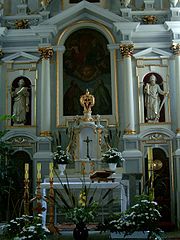
A History Of The Mass And Its Ceremonies In The Eastern And Western Church -Rev John O'Brien A.M.
CARMELITES
This order, so called from Carmel, in Palestine, where Elias, the holy prophet, dwelt in a cave, owes its origin principally to Berthold, a monk and priest of Calabria, who with a few companions erected in 1156 some huts on the heights of Mt. Carmel. The Carmelites themselves claim Elias as their founder.
The peculiarities of their manner of saying Mass are these: They recite the psalm “Judica me, Deus,” on their way to the altar, and not standing in front of it, as we do; and, like the Carthusians, pour water and wine into the chalice before the beginning of Mass. On the greater festivals of the year they repeat the “Introit” three separate times; on other occasions only twice, as with ourselves. The moment they uncover the chalice at the Offertory they make the sign of the cross over the bread and wine, in the name of the Father, and of the Son, and of the Holy Ghost; then they make the oblation of both Host and chalice under one form of prayer—viz., “Suscipe Sancta Trinitas”—which we are accustomed to say after the oblation has been finished; but their prayer has an addition to it that ours has not. They say before the “Secreta”: “Domine, exaudi orationem meam, et clamor meus ad te veniat.” At the “Hanc igitur” they incline to the altar and remain in that posture until the “Quam oblationem.” They extend their arms in the form of a cross from the time they begin the “Unde et memores” until they reach the part at which the crosses are to be made. After the last of the three prayers preceding Communion they say (in Latin, of course): “Hail, Salvation of the world, Word of the Father, Sacred Host, Living Flesh, Deity Complete, True Man.” In saying the “Domine, non sum dignus,” they bow the knee a little and strike the breast as we do. After having blessed the people they recite the “Salve Regina,” with its responses and prayer, for which, in Paschal time, they substitute the “Regina Cæli.” After the Gospel of St. John they say, “Per evangelica dicta,” etc., as we do at the first Gospel, and then, covering their heads with their cowl, return to the sacristy reciting the “Te Deum.”
Copyright ©1999-2023 Wildfire Fellowship, Inc all rights reserved

 Keep Site Running
Keep Site Running